- What is Fresher Hiring?
- What to look for when hiring freshers?
- Pros of Fresher Hiring
- Cons of Fresher Hiring
- What is Lateral Hiring
- What to look for when hiring laterally?
- Pros of Lateral Hiring
- Cons of Lateral Hiring
- Fresher vs Lateral Hiring - Which is Better?
- How Can Unstop Help?
Lateral vs Fresher Hiring: Which Is A Better Choice?
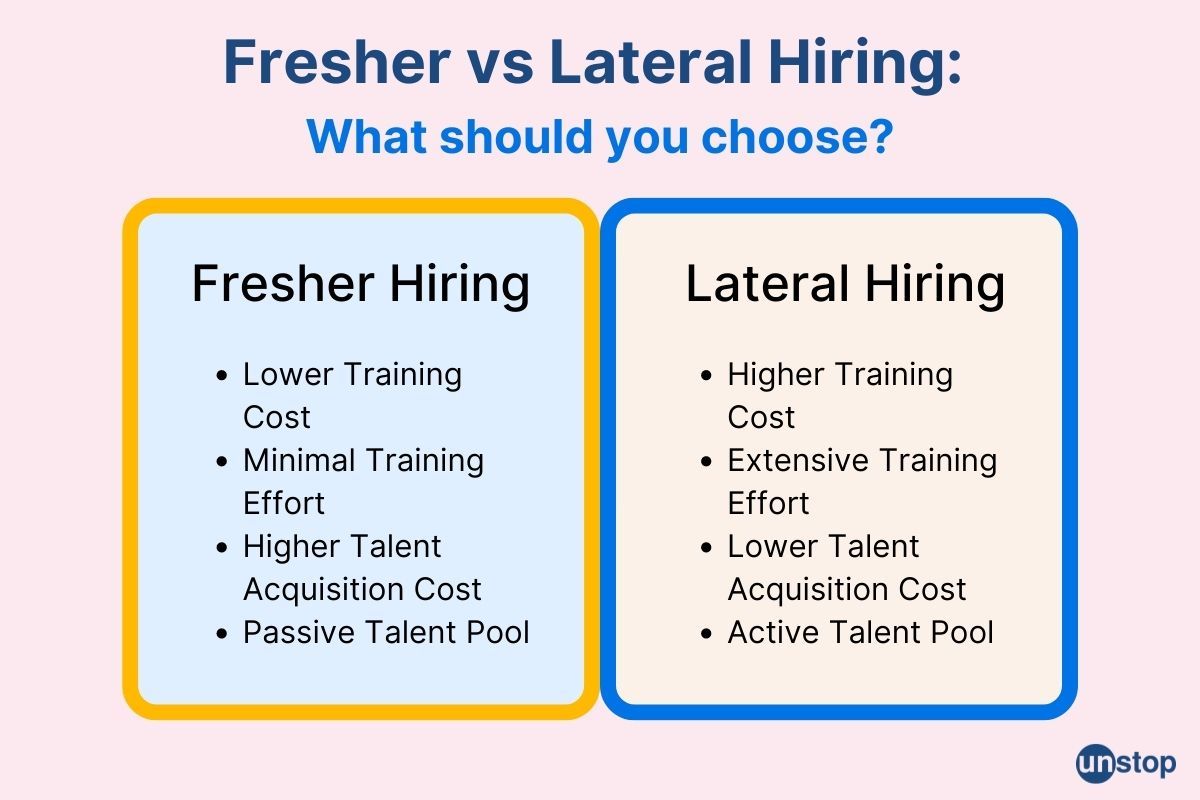
Today, organizations across the globe are in a race, but not just for profits. The new race is to find the best talent. Talent shortage, i.e., lack of skilled labour, has gripped organizations worldwide and traditional recruitment practices no longer suffice. As companies go around tweaking their hiring practices, they also need to decide if it's better to hire freshers or experienced professionals (i.e., hire laterally).
Both lateral and fresher hiring are common practices, each with its own set of advantages and disadvantages. But what exactly is fresher hiring and lateral hiring? Let’s find out.
What is Fresher Hiring?
Individuals with little to no work experience are considered freshers. Freshers are usually graduates or post-graduates looking for a job right at the end of their college education. They may have worked briefly in the past as interns or in part-time roles. In some cases, freshers may have worked full-time - but the work experience is rarely, if ever, over a year or two.
When companies hire such freshers, it’s considered fresher hiring.
Important: People changing industries are not considered freshers. While they may have limited knowledge about a new industry, they are likely to have considerable experience and knowledge about a particular job profile or role.

What to look for when hiring freshers?
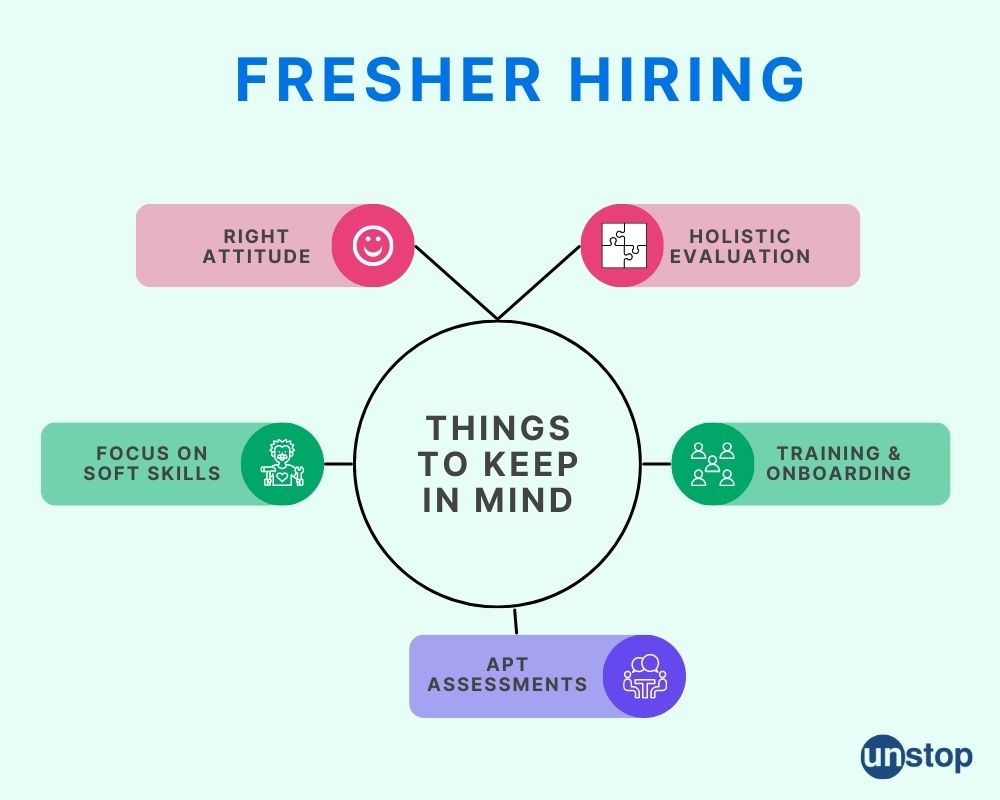
There are several routes for fresher hiring - from campus recruitment to going through job boards and hiring platforms.
Here’s a look at certain key points organizations should consider when hiring freshers:
i) The right attitude: When hiring freshers, look for candidates who have a positive attitude, are eager to learn and are confident in their abilities. Freshers have limited exposure to real-world scenarios and work culture. It’s their attitude (along with their aptitude) that can showcase whether they’ll be an asset for the company or a liability.
ii) Using the right assessment tools: A comprehensive assessment framework is incredibly important when hiring for any role. With freshers too, it's ideal to use assessment solutions that are a mix of theoretical and practical tests. It’s also critical that the assessments are tailored to specific job roles and skills.
iii) Soft skills are important: Soft skills such as problem-solving skills, creative thinking, confidence, excellent communication skills, etc. can’t be taught, but can be nourished. Thus, look for individuals who possess these soft skills and can be mentored to become excellent resources.
iv) Evaluate holistically: A common mistake when hiring freshers is to focus on academic performance alone. However, theoretical knowledge can only take you so far - it’s important to be able to apply that knowledge and adapt to changing circumstances. Thus, when hiring freshers, it’s important to assess a candidate holistically, i.e., take into account their performance in competitions, cultural or sporting events, any positions of responsibility held, etc.
v) Budget for training and engagement activities: If you believe that the hiring process for freshers stops after rolling out the employment offer letter, then you’re doing it wrong. Freshers require intense training and regular engagement activities. Most freshers are stepping into a workplace for the first time. Training and engagement activities help them navigate this new environment, while also helping cultivate a sense of loyalty and belongingness.
If you’re looking to connect with young professionals and freshers through campus recruitment, then Unstop–with a growing community of 5.6M+ users–has the right solution. Find more details here.
Pros of Fresher Hiring
Fresher hiring has several benefits, namely:
i) Tech-Savvy Learners: The primary advantage of hiring freshers is that you get access to a talent pool of tech-savvy employees. Even better, they’re eager to learn and likely to adapt faster to changing technologies and embrace new ideas.
ii) Cost effective: Considering their lack of experience, freshers are usually hired at a lower salary than experienced professionals. This enables the organization to divert that amount into other areas, including but not limited to training, employee development and recognition, and of course, company growth.
iii) Fresh perspective: Freshers bring a fresh outlook to work. They are willing to experiment and innovate, challenging set norms. Their fresh perspective, coupled with experienced seniors, can help companies bring out better products and services.
iv) Nurturing the new and retaining the old: Working with freshers can be incredibly rewarding. It also enables organizations to retain experienced employees by involving them in training new recruits. This shows trust in senior employees’ capabilities while also allowing organizations to evaluate if they’re ready for more responsibilities.
v) Brand Image: Regularly hiring and engaging with young professionals and freshers positively impacts an organization’s brand image. When a company is investing in future talent, and providing them with credible career opportunities, it translates into positive word-of-mouth advertising, especially on social media - the currency of modern-day marketing.
Cons of Fresher Hiring
Though hiring freshers has several advantages, there are also a few challenges, such as:
i) Intensive training: One of the major challenges of hiring freshers is that they require intensive training. Though it has benefits in the long run, in the short term it can put a strain on the company’s resources. The level of hand-holding that freshers require can also turn stressful if the company is short on resources or rushing to meet targets. This is why, it’s important to have a hiring plan in place and schedule recruitment.
ii) Protracted onboarding: From company culture to software tools and workplace etiquette, freshers are learning everything on the go. Naturally, this makes the onboarding process incredibly time-consuming, especially when compared to the time taken by experienced professionals. Freshers may bring new ideas, but they can’t hit the ground running with them.
iii) Company-culture fit: Since freshers are working for the first time, they’re unaware of the kind of working environment that best suits their needs. Despite training and mentorship, they may struggle to adapt to the company culture or style of working, and even switch organizations. Experienced hires, on the other hand, have a better understanding of how a company operates, and the style of working they best thrive in.
What is Lateral Hiring
Lateral hiring is the process of hiring individuals from other organizations, who possess the requisite skills and experience that you require for a role in your company. The name comes from the term lateral, which means movement from one side to another i.e. horizontal movement.
Organizations hire laterally when they require experienced professionals who are familiar with the role and at times, even the industry. It’s usually done for senior roles in an organization. A key point of lateral hiring is that in this case, the candidates are not actively looking to switch i.e. they’re passive candidates, not in the job market for a new role. Thus, organizations need to invest in researching potential candidates and making the right offer to selected candidates.
Today, it’s become the go-to approach for organizations looking to hire the best available talent in the job market.
What to look for when hiring laterally?
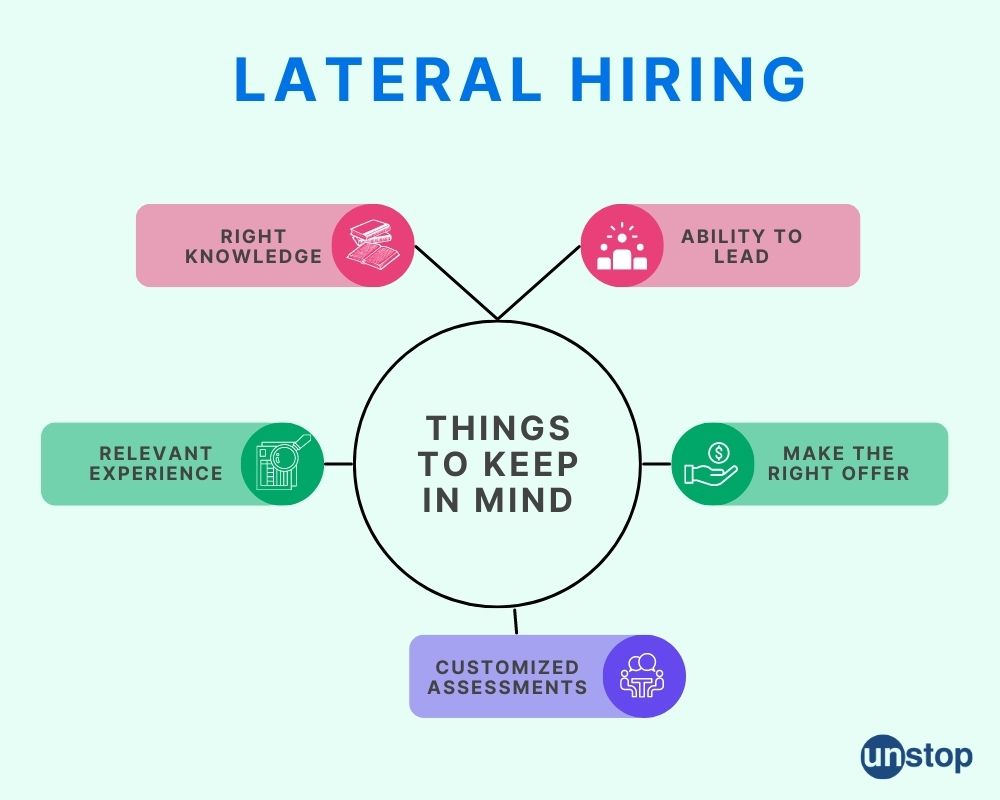
Lateral hiring is more specialized in nature and there are a few things that organizations should keep in mind when hiring laterally:
i) Industry/Technical Knowledge: The very purpose of lateral hiring is to find someone who has a specific skill set and knowledge. Thus, it’s important to look for candidates who are technically proficient and possess the industry knowledge you’re looking for.
ii) Ability to lead: Lateral hiring is mostly done for senior-level positions and thus, candidates should possess the ability to lead and manage teams. Leadership skills, along with an ability to adapt and creatively solve problems are qualities that you should look for in candidates when hiring laterally.
iii) Adequate and relevant experience: It’s crucial that candidates have relevant experience. For example, if you’re hiring for a social media manager, then the candidate should be experienced with social media marketing and tools. Here, it’s not just the years of work experience that counts, but also the type of work done.
iv) Custom assessment: Assessment frameworks should always be tailored for the required role, but this is even more critical when hiring laterally. When hiring freshers, organizations can opt to provide a general idea of the roles and responsibilities and a broad assessment solution can yield desired results. But not when hiring laterally. Since the ask is extremely specific, it’s important that the assessment is equally detailed and specific.
v) Focus on the offer: Organizations have to ensure that the final offer made to selected candidates values their experience and expertise. In lateral hiring, the candidate is usually not looking for the role. Rather they’re approached by the organization. In such a scenario, organizations have to ensure the role they offer is lucrative enough to attract an experienced professional.
Situational Example: Let’s take an example to better understand what organizations should keep in consideration when hiring laterally:
A writer with 5 years of experience but a cursory knowledge of social media tools is not a great fit for the role of social media manager. They may be able to write great copies, but would not know what makes those copies trend on social media. On the other hand, a social media executive or manager with 3 years of experience in the field and technical knowledge of writing content is better suited for the role - they bring in the technical expertise and relevant experience. To assess their skills, they could be asked to write social media copies, take a time-bound, proctored grammar test, and come up with social media campaigns. This would be a comprehensive assessment tool.
If you’re looking for a way to hire professionals that are the right fit for your organization, then check out our advanced talent solutions for lateral hiring here.
Pros of Lateral Hiring
Lateral hiring has several benefits over traditional hiring processes, namely:
i) Reduced training time: Since lateral hires possess the required skills for the role, it significantly reduces the time and cost of training, and the new employees can hit the ground running.
ii) Increased productivity: Through their expertise, lateral hires help fill the skill gap in a team. This, in turn, boosts productivity and improves efficiency. This is one of the main reasons why organizations invest time and money in hiring laterally.
iii) Networking opportunities: Since lateral hiring is more often than not done for senior roles, it leads to improved networking opportunities. Experienced professionals have an expansive professional network and organizations can benefit from the same.
iv) Fresh perspective and knowledge to incorporate it: Much like freshers, lateral hires also bring a fresh perspective. However, unlike freshers, they also have the experience to understand how to incorporate a new approach - making their outlook considerably more valuable.
Cons of Lateral Hiring
Let’s now understand the major challenges of lateral hiring:
i) Incompatibility: One of the biggest challenges in hiring laterally is the incompatibility between the new employee and the company culture. Freshers can be trained and molded into the company culture, but it’s much more difficult to do so with experienced employees. Moreover, they’re likely accustomed to a certain style of working and upskilling or changing habits can be difficult.
ii) Costly affair: Because of their depth of experience, lateral hires demand a higher salary, along with other benefits. Moreover, since they’re the ones being approached for a role, they are in a better position to negotiate.
This is why it’s important that organizations invest in retaining lateral hires through peer connect and informal networking events, among other approaches.
Fresher vs Lateral Hiring - Which is Better?
The short answer to this question is that it depends on the company’s requirements.
If an organization is increasing the size of its production, the focus should be on freshers - who can learn execution and carry out the tasks at a lower cost. But, if its focus is on changing production strategies or expanding the scope of work, then it should hire experienced professionals with the required knowledge.
Of course, in certain cases, it may require a mix of both. If an organization is looking to diversify its offerings, merge with another company, or expand into a new domain, it’s like to require freshers to execute the project and laterals to manage and command it.
How Can Unstop Help?
Here’s a quick look at the difference between fresher and lateral hiring:
|
Criteria |
Lateral Hiring |
Fresher Hiring |
|
Type of job seeker |
Passive |
Active |
|
Cost of training |
Low |
High |
|
Cost of talent acquisition/ Compensation |
High |
Low |
|
Training and onboarding effort |
Minimal |
Extensive |
As is evident by the table, there is no fixed answer to which hiring is better.
However, Unstop’s hiring solutions have an answer for even the most difficult-to-solve recruitment problems. Having partnered with organizations from different industries, like Walmart, Flipkart, Hero MotoCorp, Tata, etc. Unstop is a leader in revolutionizing recruitment.
Here’s what our partners have to say:
“Unstop’s reach to 42000 + colleges has helped Optum propel its brand. They work seamlessly by putting clients' needs at the forefront and bringing innovative solutions to the table.”
- Swati Patwardhan, Director, Early Careers (APAC), Optum
“It was overwhelming for us to have received 50000 registrations for CodeHers & almost 250 women hires in the very first year of our association. Through SparkPlug we were able to get 157 summer interns.”
- Sonia Vijay, Campus Program Lead, Walmart Global Tech
“The various stages of our competition are brilliantly managed & anchored by Unstop. They are the recommended partners in getting the right & the best fit."
- Roshni Das, Head, Rewards & Talent Management, Marico
Find more information about the various hiring solutions that Unstop has to offer here.
Suggested Reads:
I’m a reader first and a writer second, constantly diving into the world of content. If I’m not writing or reading, I like watching movies and dreaming of a life by the beach.
Login to continue reading
And access exclusive content, personalized recommendations, and career-boosting opportunities.
Subscribe
to our newsletter
Blogs you need to hog!
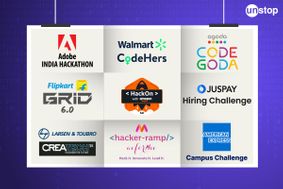
Organize Hackathons: The Ultimate Playbook With Past Case Studies

What is Campus Recruitment? How To Tap The Untapped Talent?
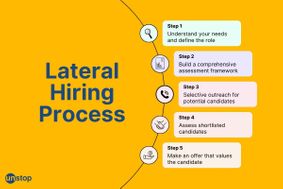
Lateral Hiring: A Complete Guide To The Process, Its Benefits, Challenges & Best Practices
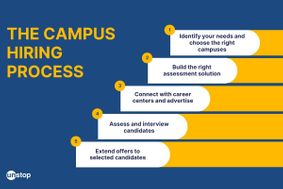











Comments
Add comment